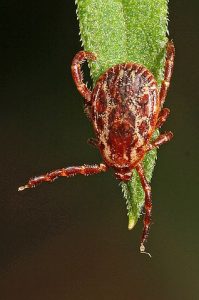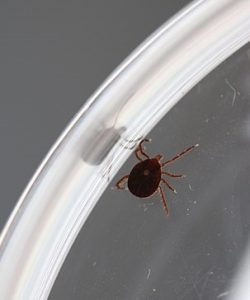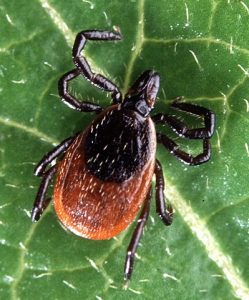
Types of Ticks Found in North Carolina
Ticks are arachnids, meaning they’re related to spiders, and if you look at one, you’ll see they actually closely resemble spiders with 8 legs, a wide body, and no antennae. North Carolina is home to multiple varieties of ticks, and they are found living in tall grasses, bushes and shrubs, wooded areas, and leaf litter. As raccoons, dogs, or humans brush past where they’re sitting, they’ll climb on and attempt to attach to the “host” through biting.
American Dog Tick

The Brown Dog Tick
The brown dog tick can be active all year because it lays eggs in cracks and gaps in kennels and homes. It looks very similar to the American dog tick, and while they rarely attach to humans, they feed on dogs and breed quickly, meaning they can quickly infest a kennel or place where multiple dogs live.
The Lone Star Tick

The Black-Legged Tick

Diseases and Illness Caused by Ticks in North Carolina
The biggest fear of ticks is due to the dangerous diseases they carry.
Rocky Mountain Spotted Fever
Unlike the name suggests, this disease is found in ticks throughout the U.S. and is the most common tick-borne illness in North Carolina. Carried by the American dog tick, symptoms appear within 2 to 14 days and include flu-like symptoms and a rash beginning on the wrists and ankles. Rocky Mountain spotted fever can be fatal if untreated.
Lyme Disease
While it’s the most well-known tick-borne disease, it’s actually very rare in North Carolina and only carried by the black-legged tick (deer tick). Early symptoms include a “bull’s-eye” rash pattern around the site of the tick bite and may be accompanied by flu-like symptoms and muscle pain and stiffness. If left untreated, inflammation of the brain and nerves can occur along with chronic arthritis and joint pain.
Ehrlichiosis
Carried by the lone star tick, ehrlichiosis is a dangerous bacterial infection. Symptoms appear within 14 days of a tick bite and include high fever, muscle aches, headache, and small percent experience a rash. If left untreated, the infection can lead to organ failure, seizures, and coma, though this is incredibly rare.
Alpha-Gal Allergy
The alpha-gal allergy is a reaction to a sugar molecule found in meat from mammals. A bite from a lone star tick can trigger a reaction in the body that leads to being allergic to alpha-gal. This means the affected person may develop an allergy to beef, chicken, lamb, and pork and experience severe reactions after eating meat, including rash, hives, difficulty breathing, and severe digestive reactions.
Avoiding and Preventing Ticks in Raleigh
While we included descriptions and images of ticks, you probably don’t want to get close enough to one to see if it’s got black legs or a spot on its back. We don’t blame you, so here are some tips for preventing getting bitten by a tick and reducing their presence in your yard and landscaping.
Protect Your Property
- Keep your grass short and mow regularly
- Bag or rake and remove long clippings
- Eliminate brushy areas or brush piles
- If your property backs up to wooded areas, create a 3-foot wide barrier of dry wood chips (not the damp shredded mulch) to create a dry, hot space ticks can’t cross.
Protect Yourself and Your Family
- Use an insect and bug repellent containing DEET.
- Wear long pants, long sleeves, socks, and shoes (no sandals) when working in the yard or going into a wooded area
- Before going inside or getting in your car, do a tick check on yourself and your family members. Check clothing, shoes, and even hair to make sure you didn’t pick up a pest.
- Check your pets for ticks before they come in the house.
- Use a vet-prescribed tick preventive product on your cat or dog.
- If you do find a bite or a tick, follow CDC protocol for removing a tick.
Contact Our Raleigh Pest Control Service for Tick Prevention
At Stomp Pest Control, we want to help keep you and your family safe so you can enjoy the summer. Our mosquito preventive spray also does an amazing job at reducing the prevalence of ticks. Combining regular mosquito treatment with the recommendations above should give you the peace of mind to spend time outdoors and allow your kids and pets to play freely. To learn more, contact us today at (919) 231-3292 or fill out our contact form below.

